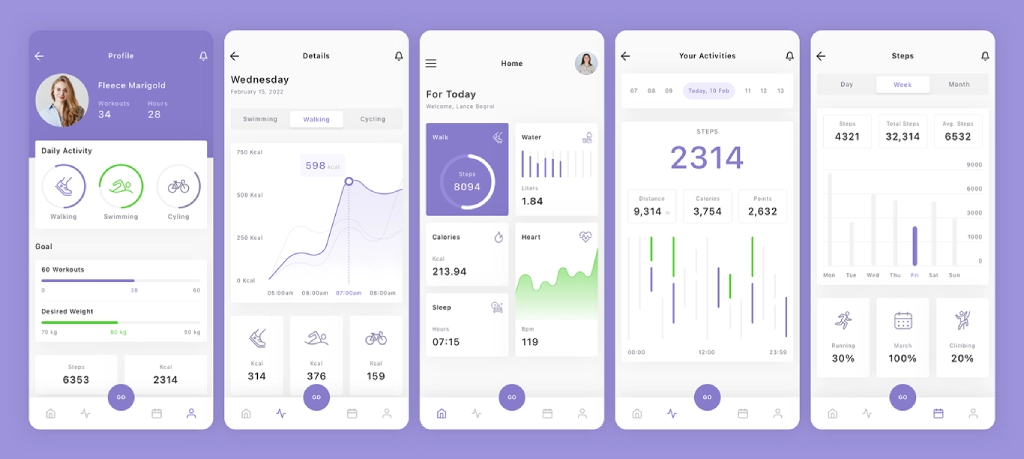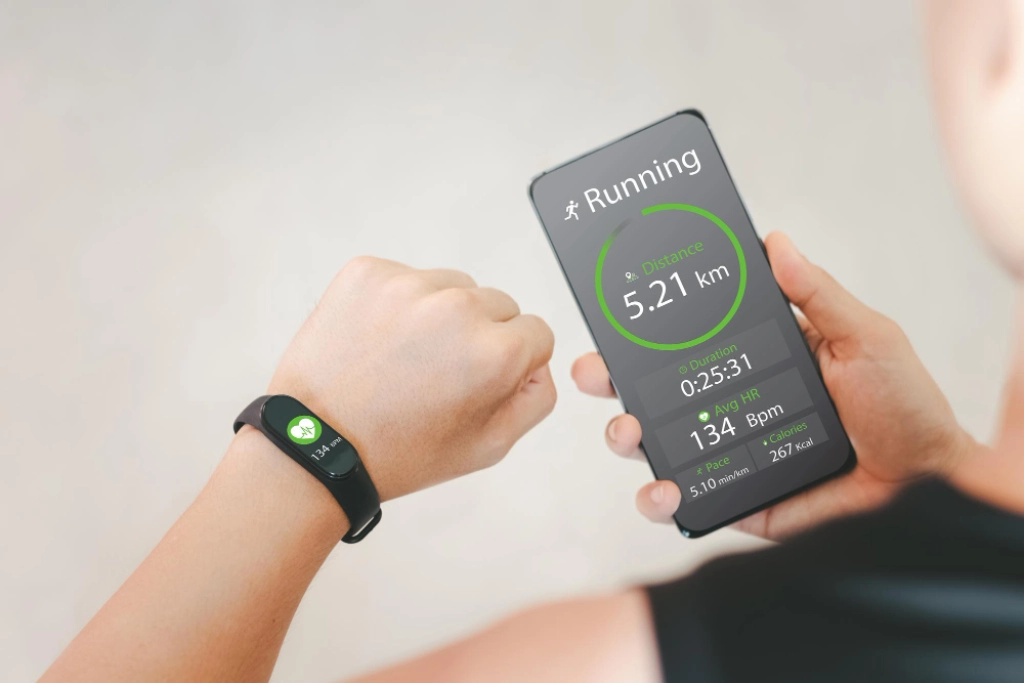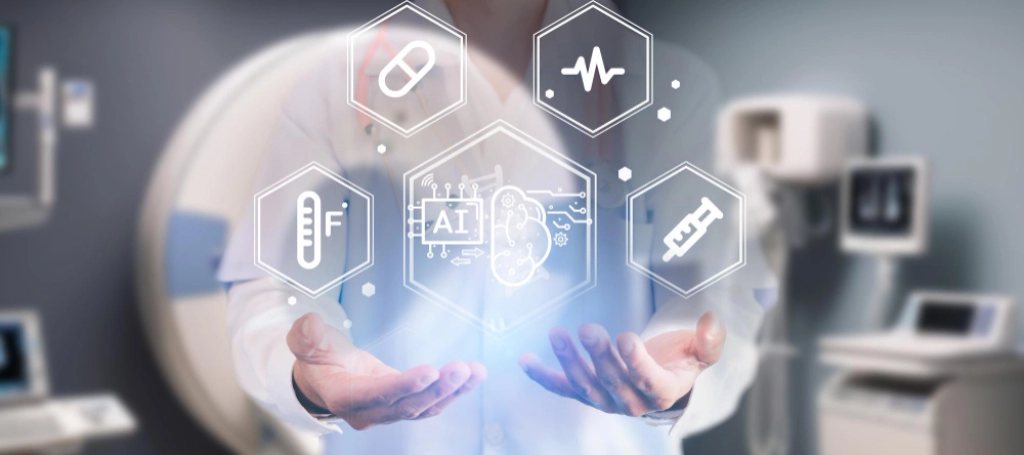Table of Contents
ToggleBuilding a health monitoring mobile app in 2025 doesn’t just take vision; it takes investment. On average, mobile app development costs range from $20,000 for a basic tracker to $100,000+ for a full-scale AI-powered health platform.
According to Fortune Business Insights, the global mHealth apps market size was USD 36.68 billion in 2024 and is projected to grow from USD 40.65 billion in 2025 to USD 88.70 billion by 2032. This rapid growth makes it clear that health apps aren’t just a trend; they are the future of healthcare.
But here’s the real secret: the money you spend is only as valuable as the features you choose.
Think real-time health monitoring apps that track vitals instantly, or AI-powered health apps that predict risks before they happen.
In this blog, I will walk you through the exact costs, health monitoring mobile app features for 2025, and the trends you need to know to build one of the best health apps for 2025.
Health Monitoring Mobile App Development Cost
In 2025, the digital health market is booming as people increasingly rely on apps to track fitness, nutrition, sleep, and chronic conditions. Naturally, businesses want to know: What’s the cost to build a health monitoring app?
On average, the cost of a real-time health monitoring mobile app depends on factors like app complexity, tech stack, wearable integrations, and compliance requirements such as HIPAA/GDPR.
Here’s a quick breakdown:
1. Basic health data tracking app (MVP): $20,000 – $40,000
Perfect for startups wanting a simple health data tracking mobile app with core features like vitals monitoring or a heart rate monitoring app.
2. Mid-level app with AI & wearables: $50,000 – $80,000
Includes AI-powered health mobile apps, sleep tracking mobile app features, and wearable device integration apps with Fitbit, Apple Watch, or Google Fit.
3. Advanced app with AR/VR, IoT & predictive analytics: $100,000+
Enterprise-grade apps featuring remote patient monitoring apps, AI diagnostics, AR/VR for virtual healthcare, and IoT-driven health ecosystems.
Regional Cost Comparison
| Region | Basic App Cost (USD) | Advanced App Cost (USD) | Hourly Rates |
| India | $15,000 – $40,000 | $60,000 – $90,000 | $25 – $50 |
| USA/Canada | $40,000 – $80,000 | $100,000 – $150,000+ | $80 – $150 |
| Europe | $30,000 – $70,000 | $90,000 – $130,000 | $60 – $120 |
Pro Tip: If you are considering building a health monitoring mobile app, hiring a React Native mobile app development company in India is one of the most cost-effective approaches.
It gives you the perfect balance between affordability and high-quality development, especially when you need scalable apps with AI-powered health features and wearable device integration.
For a deeper breakdown specific to the Indian market, check out our article on how much does it cost to develop a healthcare mobile app in India.
Key Features of Health Monitoring Mobile Apps
Health apps in 2025 are more than just step counters; they are like a personal doctor, fitness coach, nutritionist, and wellness guide all rolled into one app.
To build one of the best health mobile apps, here are the health monitoring app features 2025 you cannot afford to miss:
1. Smooth Onboarding & Personal Profiles
Imagine downloading a mobile app and being able to sign up in seconds using your phone, email, or smartwatch.
That’s what a user-friendly onboarding experience does: it gets users started fast. Add a personalized dashboard that highlights only their vitals, diet plans, or workouts, and suddenly your app feels custom-made.
2. Real-Time Health Tracking
A great app should feel like a live health dashboard in your pocket. From tracking blood pressure and oxygen levels to acting as a heart rate monitoring app, users expect instant feedback.
Pair this with IoT-powered wearable device integration mobile apps, and you have got a system that updates in real-time, no manual input required.![]()
3. AI-Powered Health Insights
Data is useful, but insights change lives. With artificial intelligence, your mobile app can predict risks before they happen, think of it as a personalized health insights app whispering advice like “Hey, you’re not sleeping enough, your stress levels are up, time to slow down.”
This makes the app less of a tool and more of a digital health companion.
4. Remote Patient Monitoring & Telehealth
Gone are the days of waiting rooms. With a remote patient monitoring app, patients can share health data directly with doctors and even have secure video consultations.
For someone with a chronic condition, this feature is a lifesaver, ensuring healthcare is accessible from anywhere.
5. Medication & Appointment Reminders
Think of this as a pocket-sized assistant that never forgets. Pill reminders, gentle nudges to hydrate, or calendar alerts for doctor visits, these small touches build trust and help people stay consistent with their care plan.
You can learn more in our complete guide on pharmacy mobile app cost and features
to understand how medicine delivery and e-prescriptions are shaping digital healthcare.
6. Fitness & Activity Tracking
No health mobile app is complete without fitness features. A solid fitness app features list should include step counters, calorie burn tracking, and workout logs.
Going beyond fitness, sleep tracking mobile app functionality helps monitor sleep quality and stress patterns, offering holistic wellness monitoring.
7. Diet & Nutrition Management
Nutrition is central to preventive healthcare. With AI-based meal planning, mobile apps can suggest personalized diets based on health goals. Meanwhile, nutrition tracking app features like hydration alerts and calorie intake monitoring ensure users stay consistent with healthy eating habits.
8. Emergency Alerts & SOS
In critical moments, speed matters. Health monitoring mobile apps with one-tap SOS alerts allow users to instantly notify emergency contacts. Live GPS sharing ensures doctors, ambulances, or family members can respond quickly, making this one of the most life-saving top wellness mobile app features.
9. Gamification & Wellness Challenges
What if staying healthy felt like a game? By adding leaderboards, badges, and rewards, your app transforms workouts and wellness goals into fun challenges.
These top wellness mobile app features turn everyday health tracking into something users actually look forward to.
10. Data Security & Compliance
Health data is deeply personal, and trust is non-negotiable. That’s why building a secure health data mobile app with HIPAA/GDPR compliance isn’t just a legal requirement; it’s what convinces users that their privacy is safe.
11. Integration with Wearables & Smart Devices
Apple Watch, Fitbit, or Google Fit users expect their devices to sync effortlessly. A wearable device integration mobile app ensures data flows smoothly, making the app part of a bigger smart health ecosystem.
12. Cloud Storage & Sharing
Finally, no modern health data tracking mobile app is complete without the cloud. From syncing across devices to sharing reports with doctors or family, cloud integration makes the mobile app collaborative, not just individual.
All these health monitoring mobile app features in 2025 are what will separate average apps from the best health apps for 2025. The more your mobile app delivers personalization, integration, and security, the higher its chances of long-term success.
Popular Health Monitoring Mobile Apps in 2025
The competition in digital healthcare is fierce, and only a few mobile apps have managed to set the gold standard in user experience, innovation, and trust.
These platforms are not just tools; they have become daily companions for millions, guiding them in fitness, nutrition, sleep, and even mental health.
If you are looking to build one of the best health mobile apps for 2025, studying these top health & wellness mobile apps in 2025 is a great starting point.
| App Name | Core Strengths | Key Features |
| Fitbit | Fitness & Wearables | Real-time health monitoring apps, heart rate & sleep tracking, smooth wearable device integration app |
| MyFitnessPal | Nutrition & Lifestyle | Nutrition tracking app features: calorie counter, meal logging, personalized diet plans |
| BetterMe | Holistic Wellness | Fitness routines, weight management, sleep tracking mobile app features, and mindfulness tools |
| Calm | Mental Health & Stress Relief | Guided meditation, stress management, top wellness mobile app features like sleep stories & breathing exercises |
These apps showcase what users now expect: a mix of real-time tracking, AI-powered insights, and personalized health support.
Want to know the budget needed for a Calm-style app? Read our detailed guide on the cost of building a mental health mobile app like Calm.
Future Trends in Health Monitoring Mobile Apps
The next wave of AI-powered health mobile apps is not just about tracking, it’s about predicting, preventing, and personalizing healthcare experiences.
With rapid advancements in technology, the future of health monitoring mobile apps will be smarter, more immersive, and more secure than ever before.
Here are the key mobile development trends to watch in 2025:
1. AI & Predictive Analytics
Health mobile apps will go beyond recording data; they will use AI to analyze patterns and predict health risks before they occur.
Imagine your mobile app notifying you, “Your sleep quality is dropping and your heart rate is higher than usual; this could be an early sign of stress or illness.”
These insights will make AI-powered health apps indispensable daily companions.
We have covered this in detail in our blog on how AI is taking over healthcare mobile apps, where we explain how machine learning is redefining diagnostics and patient care.

2. AR/VR in Healthcare
Immersive technology will change how we approach wellness. With AR/VR-powered features, users can attend virtual fitness classes, practice guided meditation, or even participate in therapy sessions from their living room. For healthcare providers, AR/VR will assist in patient education and rehabilitation, making it a game-changer in top wellness mobile app features.
3. IoT Ecosystems
The Internet of Things (IoT) is expanding into healthcare at lightning speed. By 2025, smart beds, glucose monitors, and wearable patches will sync directly with your health tracking mobile app.
This creates a connected ecosystem where every device contributes to a unified health profile, giving users and doctors a 360° view of wellness.
4. Blockchain Security
With sensitive health data at stake, security is more critical than ever. Blockchain technology will take secure health data mobile apps to the next level by storing records on immutable,
decentralized ledgers.
This not only increases trust but also ensures data can’t be tampered with, making it the gold standard for privacy and compliance.
In short, the future of health monitoring mobile app features in 2025 is about creating smarter, safer, and more interactive experiences. Businesses that use these innovations early will have the edge in delivering the best health mobile apps for 2025 and beyond. Partnering with a professional Mobile App Development in Jaipur can help turn these ideas into reality efficiently, ensuring apps are feature-rich, user-friendly, and delivered on time.
Why AlphaKlick is Your Best React Native Development Partner
At AlphaKlick, we believe a great app isn’t just coded, it’s created with purpose. That’s why our team goes beyond lines of code to create health monitoring mobile apps that truly connect with people’s lives.
Using React Native, we blend speed, scalability, and creativity to build apps that feel natural on every device.
What makes us different?
We focus on the details that matter, smooth wearable integration, insightful AI features, and designs that keep users coming back. For us, it’s not about building “just another app,” but about creating a digital health companion your users can trust every day.
As a leading React Native mobile app development company in India, AlphaKlick ensures every project combines innovation with affordability.
Curious about what your idea could look like in reality?
Book a free consultation with our experts, and let’s map out the features, design, and cost together.
Frequently Asked Questions (FAQ)
Question: How much does it cost to develop a healthcare mobile app?
Answer: On average, costs range from $30,000 for a basic MVP to $100,000+ for advanced AI-powered health mobile apps.
Question: How much does it cost to develop a health monitoring mobile app in India?
Answer: In India, mobile app development costs are lower, typically between $15,000–$50,000 for a feature-rich real-time health monitoring app.
Question: How to make a healthcare mobile app?
Answer: You will need to define your fitness mobile app features list, select a tech stack, hire experts, and follow HIPAA/GDPR compliance to build a secure health data mobile app.
Question: How long does it take to build a health monitoring app?
Answer: A basic health tracking mobile app may take 3–5 months, while advanced mobile apps with wearable device integration and telehealth may take 8–12 months.
Question: Which is better for healthcare apps: Native or React Native?
Answer: For cross-platform cost savings, React Native is preferred. It allows faster development of scalable apps like a remote patient monitoring app without compromising performance.
Question: How do I choose the right mobile app development partner in India?
Answer: When selecting from the top mobile app development companies in India, consider their portfolio, client reviews, expertise in your industry, and pricing models. A reliable partner should also guide you through compliance, scalability, and long-term support.

